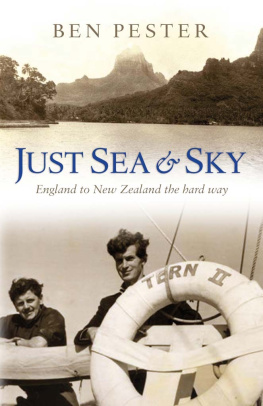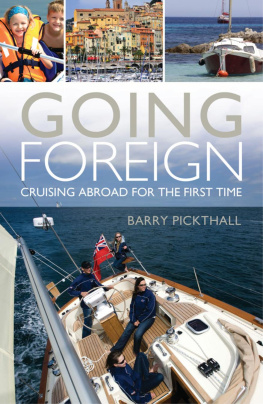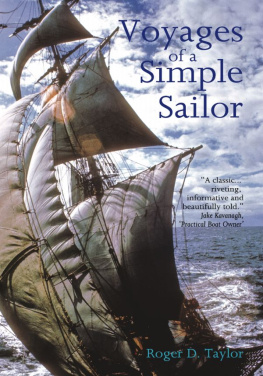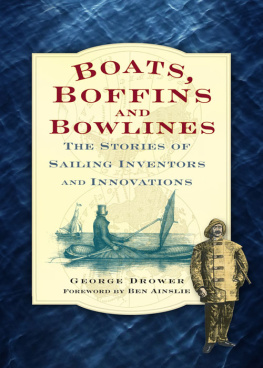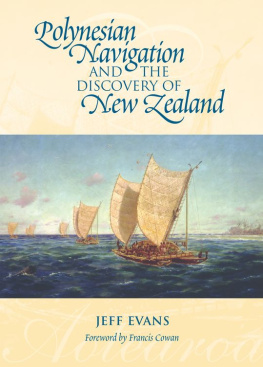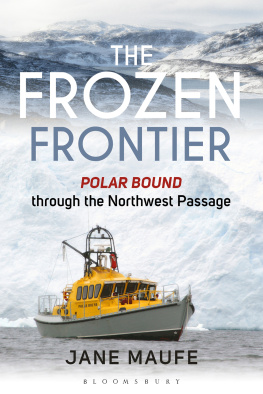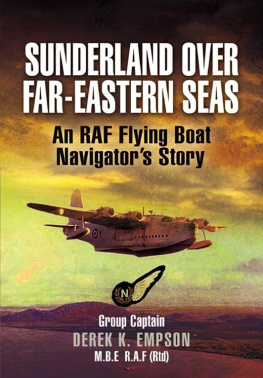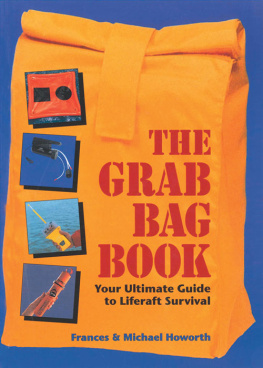DEDICATION
To Peter, my crew, companion and friend whose unstinting contribution ensured the success of our adventure together. His competency as a seaman, unfailing good humour and enduring equanimity made the cruise so enjoyable. I was immensely fortunate to have had him with me.
And to the many people we met throughout the cruise who went out of their way to offer help, friendship and hospitality. Quite a few have featured in the text but there were too many to mention individually. To all of them my heartfelt thanks and appreciation.
I have the hope that some of those whom we met will read this book or it will be of interest to their descendents.
I have special appreciation for the encouragement of my wife Susan and my daughters Anna and Jane to write this account to preserve the memories from being lost.
Ben Pester
Falmouth
December 2009
It is as hard to describe the fascination of the sea as to explain the beauty of a woman.
CLAUD WORTH
As recently as fifty years ago deep water cruising yachts were a rarity. Today their number is legion, made possible by the giant strides of scientific development. Wind and sea, the elemental underpinnings of sailing, have of course not changed, but otherwise almost everything connected with the pastime has been transformed.
This account of a passage made in a traditional sailing yacht in those earlier years aims to bring to life the way it was when blue water small boats had the oceans largely to themselves, with the arrival at each stop on passage being an event for locals and crew alike.
The story is as much about those locals as well as on sailing in a small boat the way it used to be in more relaxed times, untrammelled by the clutter of the push button world of today. It records a way of life that will never be seen again.
Tern II, taking two young men half way round the world, was a classic example of a Victorian gentlemans yacht, graciously well proportioned with a feel of the gentility and good manners associated with that era. By great good fortune she is still in existence.
In her fifty fifth year she was not much changed from her early days. She had sometime back been given an engine, an innovation frowned upon by the purists of the day, which seemingly had been something of an unwelcome guest on board. So was ours. We had a successor, a little 8 HP petrol/paraffin affair, hand cranked and hardly used but we had to live with it, being mandatory for the transit of the Panama Canal. We had no electrics, let alone electronics. All lighting, in the cabin and on deck for navigation, was by oil lamp. The only batteries were those in our torches and in a portable radio receiver, the principal purpose of the latter being to obtain time signals.
During the passage out from England to New Zealand nothing of note on board went wrong, because there was nothing much to go wrong. Navigation was by sextant and chronometer watch, satellites did not exist and had yet to be invented. Distance run and deduced speed were by towed Walker patent log, with depths taken by hand lead and line. No self steering devices were carried. Except when she sailed herself every mile was hand steered.
We had no radio transmitter. To identify ourselves, if need be, we hoisted our signal flags. Weather forecasting was by the barometer, the look of the sky and run of the sea but in the end we just took what came along. Advance warning by radio would have been of no real value, only serving either to lift our spirits or alternatively thoroughly depress us. Foul weather gear was a long oilskin coat and bare feet.
Since those days the development of ocean sailing has been staggering, made possible by the explosion in technology, but one has to wonder if perhaps some of the plot has been lost? Sailing, after all, is essentially a basic art. The modern boat is stuffed full of the latest, must have, electronic equipment but how much of it is really necessary or even desirable? The seductive power of this wizardry to induce total dependence on it is to court disaster. What better authority to refer to than Sir Robin Knox-Johnson who, in a recent ocean race, complained ...the... phone kept cutting out more bloody useless expensive electronics. It was all easier 38 years ago when none of these gadgets had been invented, so one did not miss them.
If freed from the grip of ever better and better technology, with its all pervasive and intrusive domination, one can then experience the simple pleasure of sailing the way it was once enjoyed. That is what this account is all about.
Some day the history of the sea will be divided into two great periods. The Age of Simplicity and the Age of Complication.
FELIX RIESENBERG , AUTHOR AND MASTER MARINER
by Dick Durham
I would like to have sailed with Ben Pester, but I was only two years old in 1953 when he was looking for a crew to join him aboard Tern II, his 39ft gaff yawl, for a 14,000 mile cruise from Plymouth to Auckland, New Zealand.
However having read Just Sea and Sky, his compelling story of that voyage, I now feel I have sailed with him. Ben has the gift of bringing the reader along for the passage and his prose leaves as clear a wake in your mind as Tern IIs long keel does across the ocean.
Ben, a New Zealander, himself, came to the UK in 1943 to serve with the Royal Navy. His droll and free-thinking antipodean views about the origins of World War II: There was in the aftermath of the war a view that Churchill had resolved a conflict which he had played a major role in starting in the first place, came as something of a shock to an Englishman brought up on the chauvinistic propaganda that Winston Churchill was the saviour of the sceptred isle. The green and pleasant Jerusalem promised to returning warriors was in fact a monochrome and bankrupt land inhabited by disillusioned people from among whose ranks came a bulging post-bag of respondents to Bens advert for a crew.
The one he chose was Peter Fox, a Portsmouth-based yachtsman, and it is with him the reader shares their first landfall in the Canaries from the deck of Tern II, the thoroughbred Victorian gentlemans yacht, which once belonged to the legendary yachtsman and author Claud Worth: It was a beautiful night, soft and warm but impenetrably black. We needed the (leading) lights. Peter went up forward to get a clear view under the foot of the jib. Got them! One, two, three, four...seven, eight, nine, ten. I give up there are hundreds of the b***** things! the explanation soon became clear: close by were dozens of fishing boats all using red flares.
The author treats the reader to historical asides which put the cruise into cultural, political and sociological context. Whether its the moribund sight of a Grand Banks schooner arriving in Lisbon with its holds full of fish; the sourness of the slaving legacy behind the sweetness of West Indian Calypsos, or the misguided do-gooding of European missionaries in the Pacific, Ben always provides a greater picture thereby bringing gravitas to a privileged voyage.
Along the watery highway Ben introduces great figures from the past who have helped fill the psyches, of those of us whove never been there with exotic images of these enchanting isles. Literary giants like Herman Melville, pirates like William Dampier, the unique Charles Darwin as well as other cruising sailors from William Albert Robinson to Eric Hiscock all join Bens cruise at appropriate stages.
Then there is the adventure itself, from the swim Tern II

